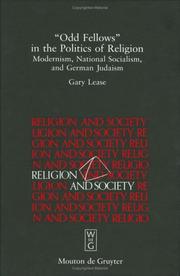| Listing 1 - 2 of 2 |
Sort by
|
Book
ISBN: 2763783368 9782763783369 Year: 2006 Publisher: Québec: Presses universitaires de Laval,
Abstract | Keywords | Export | Availability | Bookmark
 Loading...
Loading...Choose an application
- Reference Manager
- EndNote
- RefWorks (Direct export to RefWorks)
En 1920, le Parti nazi déclare son adhésion au christianisme positif dans son programme politique. D'une perspective religieuse, une analyse des ouvrages d'Adolf Hitler et d'Alfred Rosenberg nous conduit à une explication de ce "christianisme positif" et nous étonne dans les répercussions de son application. L'hypothèse est la suivante : le nazisme comportait un objectif religieux, qui était de faire disparaître le christianisme traditionnel pour le remplacer par une vision nazie du "christianisme positif". Le livre présente la lutte antinazie de deux théologiens germanophones, Paul Tillich et Kart Barth. Tillich voit dans le nazisme une illustration de sa théorie du démonique. Le point de vue théologique christocentrique de Barth suscite une résistance au sein des Églises protestantes allemandes et la naissance de l'Église confessante. En France, la résistance spirituelle est illustrée par deux théologiens jésuites, les pères Pierre Chaillet et Gaston Fessard. L'action de ces deux témoins prend un caractère prophétique au sein d'une Église qui n'a pas encore pris conscience des implications perverses de l'idéologie nazie. Pierre Chaillet organise la résistance spirituelle en fondant un journal clandestin et œcuménique, le Témoignage chrétien. Gaston Fessard est l'auteur du premier exemplaire, " France, prends garde de perdre ton âme ". De plus, il conteste l'obligation d'une obéissance au gouvernement de Vichy en élaborant sa théorie du "prince esclave". En projetant ainsi quelque lumière sur une période particulièrement trouble du siècle dernier, ce livre montre comment politique et religion peuvent être parfois enchevêtrées et quelle lucidité (prophétique et théologique) est requise pour y voir clair et pour prendre les décisions et les engagements qui s'imposent.
National socialism and religion. --- Christianity and politics --- Church and state --- Nazisme --- Christianisme et politique --- Eglise et Etat --- History --- Aspect religieux --- Histoire --- National socialism --- National socialism and religion --- World War, 1939-1945 --- Religious aspects --- Christianity --- Germany --- Religion --- National socialism - Religious aspects --- Christianity and politics - Germany - History - 20th century --- Church and state - Germany - History - 1933-1945 --- World War, 1939-1945 - Religious aspects - Christianity --- Germany - Religion - 1933-1945

ISBN: 3110143232 311087735X 9783110877359 9783110143232 Year: 1995 Volume: 35 Publisher: Berlin New York Mouton de Gruyter
Abstract | Keywords | Export | Availability | Bookmark
 Loading...
Loading...Choose an application
- Reference Manager
- EndNote
- RefWorks (Direct export to RefWorks)
The series Religion and Society (RS) contributes to the exploration of religions as social systems- both in Western and non-Western societies; in particular, it examines religions in their differentiation from, and intersection with, other cultural systems, such as art, economy, law and politics. Due attention is given to paradigmatic case or comparative studies that exhibit a clear theoretical orientation with the empirical and historical data of religion and such aspects of religion as ritual, the religious imagination, constructions of tradition, iconography, or media. In addition, the formation of religious communities, their construction of identity, and their relation to society and the wider public are key issues of this series.
De Kerk en de burgerlijke macht: Kerk en Staat; godsdienstvrijheid; verdraagzaamheid; tolerantie:--theologische aspecten --- 261.7 De Kerk en de burgerlijke macht: Kerk en Staat; godsdienstvrijheid; verdraagzaamheid; tolerantie:--theologische aspecten --- Jews --- Modernism (Christian theology) --- National socialism --- 261.7 --- Americanism (Catholic controversy) --- Hebrews --- Israelites --- Jewish people --- Jewry --- Judaic people --- Judaists --- Ethnology --- Religious adherents --- Semites --- Judaism --- History --- Catholic Church --- Religious aspects --- Germany --- 1789-1945 --- National socialism - Religious aspects. --- Jews - Germany - History - 1789-1945. --- Catholic Church. --- Religious aspects. --- Church of Rome --- Roman Catholic Church --- Katholische Kirche --- Katolyt︠s︡ʹka t︠s︡erkva --- Römisch-Katholische Kirche --- Römische Kirche --- Ecclesia Catholica --- Eglise catholique --- Eglise catholique-romaine --- Katolicheskai︠a︡ t︠s︡erkovʹ --- Chiesa cattolica --- Iglesia Católica --- Kościół Katolicki --- Katolicki Kościół --- Kościół Rzymskokatolicki --- Nihon Katorikku Kyōkai --- Katholikē Ekklēsia --- Gereja Katolik --- Kenesiyah ha-Ḳatolit --- Kanisa Katoliki --- כנסיה הקתולית --- כנסייה הקתולית --- 가톨릭교 --- 천주교 --- Modernism (Christian theology) - Catholic Church --- Jews - Germany - History - 1789-1945
| Listing 1 - 2 of 2 |
Sort by
|

 Search
Search Feedback
Feedback About UniCat
About UniCat  Help
Help News
News